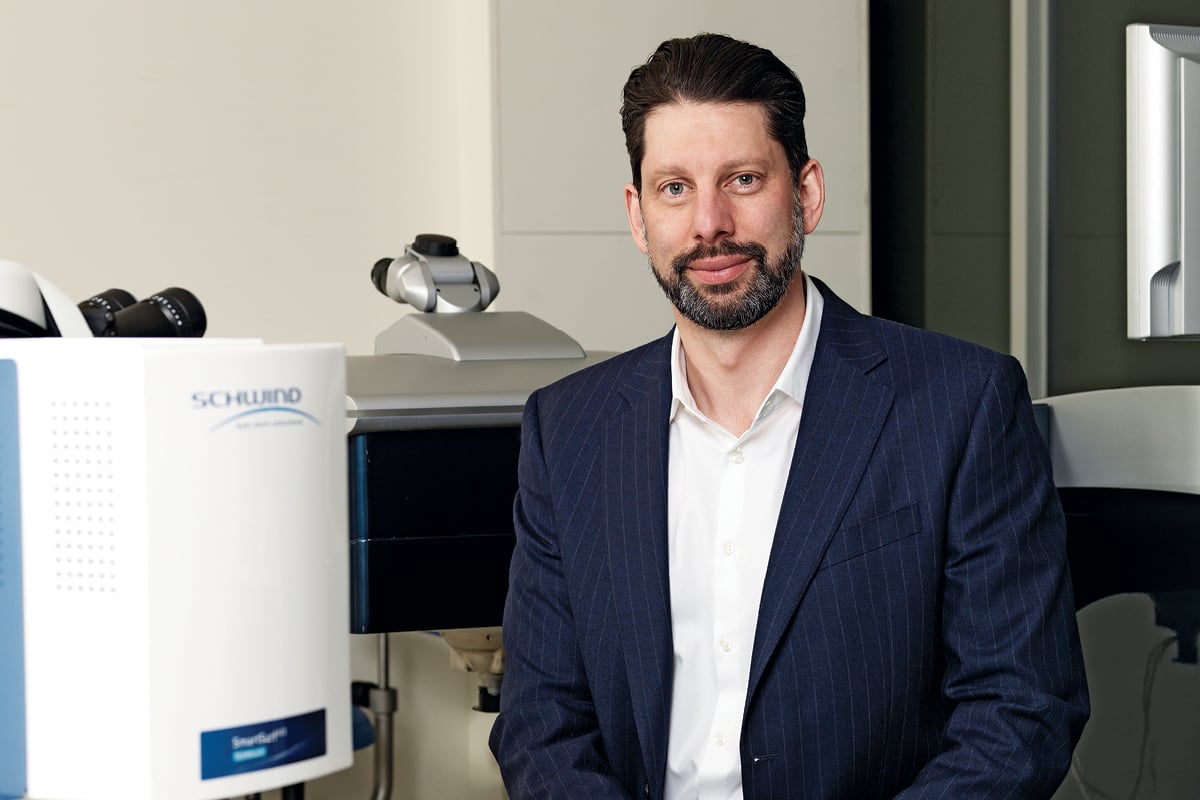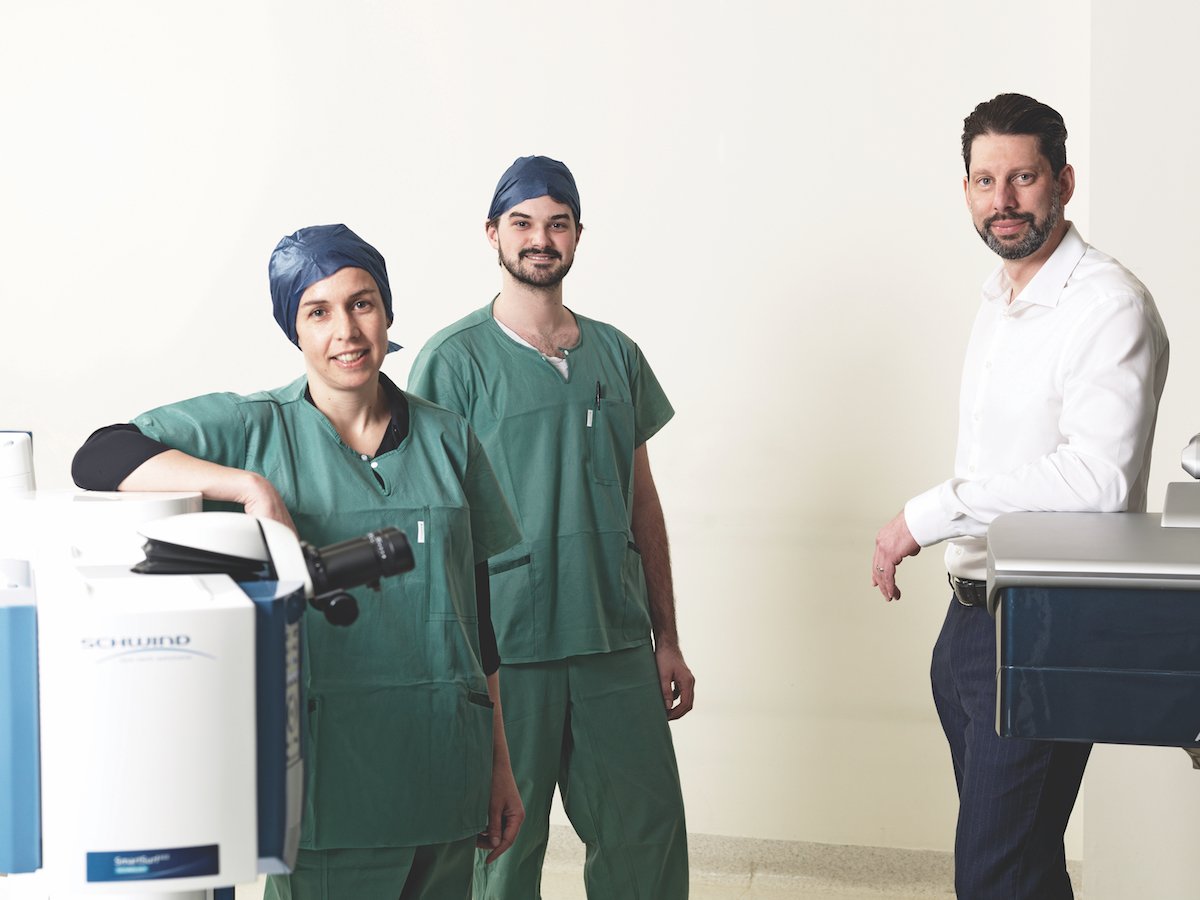The ability to see clearly is something most people take for granted. Vision impairment can have an astonishing effect on your quality of life, and it’s something almost half a million Australians struggle with daily. Leading ophthalmology services provider Vision Eye Institute recognises this struggle and doesn’t take vision for granted. With its 15 clinics and nine day surgeries across Victoria, New South Wales and Queensland, the organisation aims to have a positive impact on its patients’ eye health and, consequently, overall lifestyle.
“The best part of my job is seeing the profound impact we have on the lives of patients and their families,” says Vision Eye Institute CEO and Managing Director James Thiedeman. “Visual impairment affects how they conduct themselves on a day-to-day basis – from preparing breakfast to making a phone call or spending time with loved ones. So, when patients wake up from corrective surgery, they almost immediately experience a profound improvement in their vision. It’s incredible to think we’ve just given back some of their independence, particularly when we deal with elderly patients.”

James has been involved in the Australian healthcare sphere since his university days, getting his start in Queensland Health’s Policy and Planning Division from 1993 to 1999 before moving to Melbourne to work with Mayne Health Group and later, Affinity Health. In 2005, he returned to Queensland to take over as CEO of Ramsay Health Care’s Noosa Hospital before Melbourne’s Monash IVF Group poached him for his most notable role as CEO and Managing Director. In his eight years at the helm, James consistently led the company to increased profits and earnings through acquisitions and market-share expansion in both Australia and overseas after it listed on the ASX in 2014.
“I had a wonderful experience with Monash, but after almost a decade, I felt the time was right for a new challenge, and the opportunity presented itself with Vision Eye Institute in November last year,” James says. “Health care has always been a passion of mine, so the chance to work for another highly respected organisation really appealed to me. Having run private hospitals before, I’ve worked with ophthalmologists and visiting surgeons, but I’ve never run an eye care specialty group. So all the nuances and terminology presented a real learning curve, but it’s been an incredible year so far.”
James quickly drew similarities between Monash and Vision Eye Institute, not only in their shared commitment to patient care and outcomes, but also their geographical footprints. “We have day surgeries and consulting clinics up and down the Eastern seaboard, and we’re eager to broaden our reach into other states, such as South Australia, soon,” he says. “This is what I’ve been focused on in recent months. But it must be done so our team always has the right tools at their disposal to continue delivering great care for our patients, because eye care is highly personal and technical.”
Winning on culture
Vision Eye Institute combines a talented team of doctors, vast clinical experience, and a robust research program to provide superlative patient care. The Institute aims to deliver high-quality education, with many of its doctors taking a hands-on approach to teaching and training medical and optometry students, optometrists and ophthalmology trainees. Others are proactive in domestic and international charity programs that draw on their ophthalmic skills and expertise.
“We make a conscious effort to listen to our patients to see what we can do better, because they’re the reason we do what we do.”
“With about 450 staff and 90 doctors, we’re quite a small organisation in the healthcare arena, but it really feels like family,” James says. “People know each other on a first-name basis, and many of the staff and doctors have worked here for many years – a testament to the culture. We’re all about delivering patient-centric services that are compassionate and personalised, because vision is such an important part of life and independence. When you think about it, there are very few people you would allow to touch your eyes unless you trusted them completely. This is something we need to be very mindful of in the way we deliver care.”
A market leader, Vision Eye Institute’s success is reinforced by close relationships with suppliers including Wellmark, ScanCare and PSC Insurance Brokers. James Thiedeman explains that these essential partnerships help to foster innovation and constantly improve the business’s care offering, customer interactions and overall market share.

An industry of opportunity
The most profound change James has witnessed in his career is the way technology has merged with the healthcare sector. “In ophthalmology, the diagnostic tools and equipment available to us now, compared with 10 to 15 years back, means that we can be far quicker and more precise in diagnosing and setting patients on a treatment plan,” he says.
“However, we’ve also seen an increase in the expectations of patients, because they’re more informed than ever. Thanks to Google, they can easily jump online and get information on the symptoms they’re experiencing. This means our doctors must spend more time with patients because they’re invested and willing to ask questions about their condition – typically making the treatment journey more effective.
“The fact is 50% of the world’s population needs some type of vision correction, but only 10% are receiving treatment for it. And with the rising number of young adults staring at computers and smartphones, we’re seeing a huge increase in the number of patients with myopia – or nearsightedness – which is going to be an ongoing challenge for us globally. Myopia is easy to treat with laser corrective surgery, and we’re now working to broaden our services in this area.”
At the other end of the spectrum, James is also seeing an increasing number of elderly patients. “They’re coming in with eye diseases, such as macular degeneration and diabetic retinopathy. So, there’s a growing cohort out there, and early intervention is crucial in treating these diseases to prevent any long-term eye damage and vision loss,” he explains.
“We have to make sure we have the most up-to-date equipment to make those diagnoses and that our staff are cognisant of the needs of patients aged 65 and older. Their mobility, hearing and cognitive issues are all factors we need to consider when we prepare our care plan so we’re sensitive to their particular needs.”
James Thiedeman’s top piece of advice
“Never be shy about asking the probing questions. If something doesn’t sound right, question it and call it out, because there’s a real risk in automatically accepting what you’re being told. Trust your gut instinct.”
Future in focus
James firmly believes that Vision Eye Institute wouldn’t be able to achieve the excellent patient outcomes it does without close partner collaborations to get the latest evidence-based equipment and the best clinical information systems. “We also have to align with advertising agencies that understand our mission and language, and help us reach our different audiences,” he says.
“A good leader should articulate the vision of the organisation and then get out of the way and let the team do their job without being too overbearing,” he continues. “That might sound straightforward, but that process of articulating and communicating the strategy and vision needs to be framed in different ways for different audiences. The way I speak to my medical team is different from how I speak to my support team, so I think a good leader is able to bridge that communication difference and bring everyone together.”
“A good leader should articulate the vision of the organisation and then get out of the way and let the team do their job.”
In the short-term, Vision Eye Institute remains focused on improving its services to achieve the best clinical outcomes for patients. “We make a conscious effort to listen to our patients to see what we can do better, because they’re the reason we do what we do,” James says. “From there, we take this feedback and turn it into action – that’s a critical measure of our success.”
Vision Eye Institute is also keen to expand its geographic footprint by developing its offering not only in cities such as Melbourne, Sydney, Adelaide and Brisbane, but also in other areas in which it doesn’t currently have a presence. “We genuinely believe we provide world-class care, and we have the infrastructure and know-how to assist other like-minded providers should they wish to become part of the Vision Eye Institute group,” says James.


